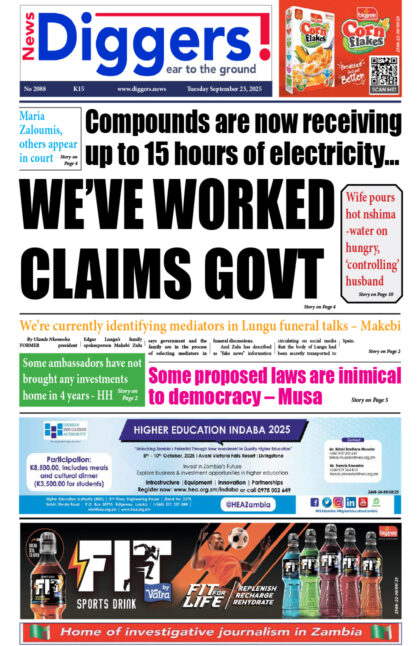Former Chairman of the parliamentary Budget Committee Highvie Hamududu says there has been enough talk about austerity measures and that government must move from mere rhetoric.
Reacting to the newly announced austerity measures, Hamududu who is also Party of National Unity (PNU) president said, in an interview, that government was suffering from an implementation deficit of its pronouncements.
He said saving of national resources needed to begin at a microscopic level and not the hit and run which government was doing.
“The savings we need must begin at microscopic level and not hit and run. What government is doing is hit and run saving. They must do a holistic austerity clean-up and it must start with the actual yellow book. We can save a lot of money and they will have a lot of money actually even to service the debt and clear the local debt which government is owing the local business people. The suppliers and contractors have been chocked. This is killing the economy when government is owing its own suppliers. They need to sit down and move beyond mere rhetoric,” Hamududu said.
Hamududu said without implementation, austerity measures remained mere rhetoric.
“There is nothing wrong with what they have said but if there is no implementation, it remains mere rhetoric. We have a very serious implementation deficit in our country where the pronouncements are many and on paper, but there is no actualisation. How many times has government announced the austerity measures? The implementation part remains mere rhetoric because of the weak delivery of those pronounced fiscal measures which themselves on the paper are okay but if the capacity to implement is very low, then it remains mere rhetoric,” he said.
“To simply put it clear, government must move from mere rhetoric to actual implementation. Government must just own up and admit there is a weakness in implementing the pronouncements they make. Government must provide leadership and demand results. They must just reduce on expenditure. Look when they travel they make allowances and are able to build houses and make themselves comfortable but at the expense of the majority of our people in our country, and these are people who are getting salaries already. And therefore service delivery is about not leaving anyone behind.”
He advised government to reduce on wasteful expenditure such as unnecessary and avoidable travels among others.
“We have heard a lot and I think enough about the austerity measures. In principle it’s the right thing to do that when faced with fiscal challenges, you apply austerity measures and austerity measures entails among other things to cut on wasteful expenditure and reduce on the irregularities because regularities are a huge cost as reviewed in the Auditor General’s report about parastatals abusing public resources. If you look at the yellow book, there are a lot of unnecessary and avoidable expenditure lines and government must do away with such. So the whole yellow book needs to be put under a microscope. If government wants to cut the budget according to the resources available now to reduce the budget deficit, they must go to the yellow book and literally clean it up,” Hamududu said.
He maintained that holding a mid-year budget review was critical in bringing back the country’s economy to life.
“I have called before for a mid-year budget review. What it does in other countries and when I was a parliamentarian, I was attached to a number of parliaments especially to South African and I witnessed the mid-year budget review, it is a very important tool where if you discover along the year that your revenue falls short of your expenditure, you go to a yellow book and do a forensic clean-up. I can tell you that [by doing that] government can actually save a lot of resources. It is possible for example to cut expenditure by 30 per cent without affecting the core service delivery by government through cutting unnecessary and avoidable expenditure like travel, both local and foreign. There are already offices across the country and so you don’t need people to be gallivanting from Lusaka. If you want to go to Zambezi, there is a DC there, there is a council chairman, the DEBTS, and a DACO there. So you work through those structures. So people who are domicile at the headquarters in Lusaka are really wasting a lot of resources for allowances and so on. I am talking of bureaucrats in every ministry, that is why the treasury is bleeding,” Hamududu observed.
Meanwhile, Hamududu further advised government to reduce on holding workshops but instead use Smart Zambia to create a platform where workshops could be held online.
“And because of this appetite to travel across the country gallivanting, they need to buy vehicles, they need to maintain vehicles, they need to draw a lot of fuel. There is a lot of room to save money if government does a forensic look and just cuts those. They must strengthen the already existing provincial and district structures,” said Hamududu.
“Government can also cut on workshops. These people when they went in those offices, they presented [qualification] papers. [So] what are they learning at these workshops? Today there are new platforms where people can do visual workshops where you are seated in your office and hold a workshop on your computer. The guy in Lusaka does not necessarily need to travel. So let smart Zambia put in platforms where people can hold workshops online. And when you cut travel, you automatically cut on the number of fleet of vehicles.”























